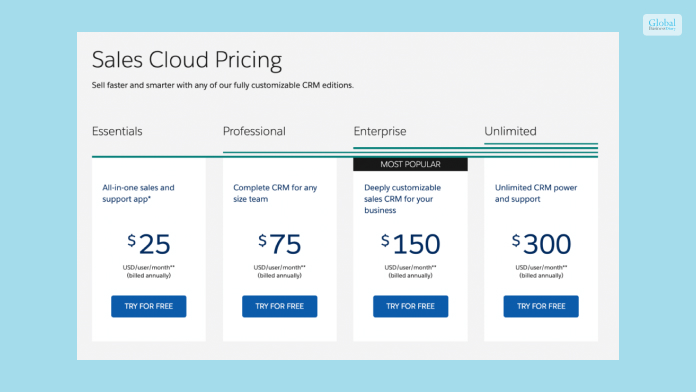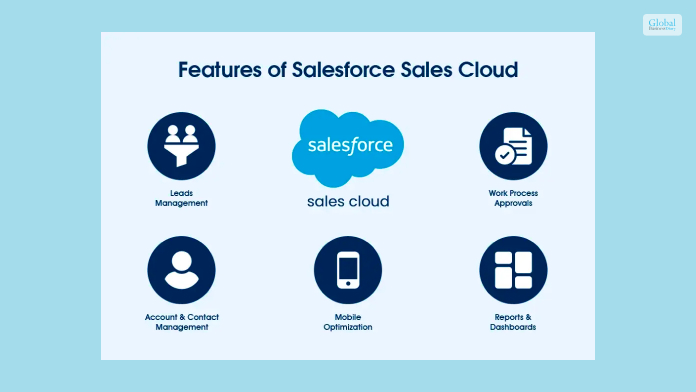What Is Salesforce Sales Cloud? – Let’s Find Out In Details

The Salesforce Sales Cloud is an automation software where you will get the combination of CRM, Data, and AI. This will help you in boosting your productivity levels and grow your business by increasing your sales. The software system comes with a lot of features that enable you to carry out your lead management and accounting processes effectively.
In this article, you will mainly get a review of the Salesforce Sales Cloud software. Furthermore, we will discuss the major features of the software system and how the software can be a great addition to your business. Finally, we will discuss some of the major pros and cons of the software. Hence, to learn more about Salesforce Sales Cloud, read on through to the end of the article.
Salesforce Sales Cloud – A General Overview Of The Software

When it comes to CRM solutions, there is hardly any software better than Salesforce Sales Cloud. More than 150K companies worldwide use the offerings of Salesforce to streamline their business processes. With automation features, you can save a lot of your time and create new values for your business while you improve your relationships and communications with customers.
According to the official website of Salesforce, Salesforce Sales Cloud lets you –
“Sell faster, smarter, and more efficiently with AI + Data + CRM. Boost productivity and grow in a whole new way with the #1 CRM for sales…Start and scale with a sales solution that’s tailored to your business. Maximize productivity, get insights, and streamline processes with the best sales software.”
If you want software that will take your customer relationship management operations to the next level, then you must consider implementing Salesforce Sales Cloud in your business. As it has great integration options, you can also get the services of other Salesforce software systems. For example, for lead management, you can integrate Salesforce Pardot easily with the Sales Cloud.
Salesforce Sales Cloud Pricing

The following are the pricing as per the plans of Salesforce Sales Cloud:
| Salesforce Sales Cloud Plans | Price |
|---|---|
| Starter | $25 per user per month (annual billing) |
| Professional | $75 per user per month (annual billing) |
| Enterprise | $150 per user per month (annual billing) |
| Unlimited | $300 per user per month (annual billing) |
| Sales Suite | $600 per user per month (annual billing) |
To learn more details about the pricing and what features you will get in regard to all these plans, check the official pricing list of Salesforce Sales Cloud.
What Are The Salesforce Sales Cloud Features?

One of the best features of Salesforce Sales Cloud is that it comes with a host of applications that is ready for integration with each other. So, the software system acts as a centralized platform for your business to check every part of your organization’s processes.
According to a review of the platform on Cargas.com,
“The Sales Cloud handles contacts, accounts, reports, dashboards, and forecasting, among other sales responsibilities. It integrates with Salesforce’s other products like Service Cloud and Marketing Cloud, as well as numerous third-party solutions.”
1. Good information on Sales Opportunities.
2. Automation of daily and mundane tasks lets you focus on important issues at hand.
3. Forecast management will help you get information on pipeline health for better decisions.
4. The revenue cloud gives you the platform to perform Billing, CPQ, and Subscription management.
5. The app helps you to enhance Sales Engagement.
6. Easy feature for tracking to plan.
Why Salesforce Sales Cloud Is A Great Option For Your Business?
According to TechRadar.com,
“Even at the upper end of Sales Cloud pricing, mature sales teams may need to purchase other Salesforce products and add-ons to mine the full potential of Sales Cloud’s capabilities. If you’re leading a large sales team and want to keep everything centralized, Salesforce is an ideal choice.”
Salesforce is a top-grade software company, and the Sales Cloud is one of its best application software systems. As a lot of companies worldwide use the services of Salesforce, hence the reports regarding Salesforce are quite good when it comes to integration, contact management, reliability, and ease of usage. You can also get a Salesforce Sales Cloud Certification if you become an expert in the software.
Essential Pros And Cons Of Salesforce Sales Cloud

The following are the major pros and cons of Salesforce Sales Cloud that you need to be aware of before you consider purchasing it for your business:
Pros Of Salesforce Sales Cloud
Here are the major pros of Salesforce Sales Cloud:
- There are many customization options that can help you in tailoring the software system based on the needs and demands of your business.
- There are many integration capabilities of the software, and it can also integrate many third-party applications if you are looking to increase the functionality of the software.
- The reports, analytics, and dashboards are straightforward and easy to use, as well as flexible.
- There are many other automation tools that are not only user-friendly but also useful for doing repetitive tasks.
- The interface is fully modern and intuitive and is straightforward to use simultaneously This ensures a great user experience.
Cons Of Salesforce Sales Cloud
These are the major cons of Salesforce Sales Cloud that you must know:
- As per industry-standards, the software is priced on the higher side, and the add-ons are also highly-priced.
- The tools are quite complex, and they need a learning curve beforehand for someone new to the software systems.
- The deployment timeline of the software system is lengthy, as customization of the software based on the business needs takes time.
- Customer support does not respond seriously to non-critical problems.
Final Thought
Hope this article was helpful for you to understand the utility of Salesforce Sales Cloud. If you are looking for an all-encompassing software for your business, then you must consider purchasing this software and implementing it. The customization and integration features of the software are top-class. Do you know of some other software systems that are as good as Salesforce Sales Cloud and great for growing businesses? Share your reviews about some in the comments section below.












